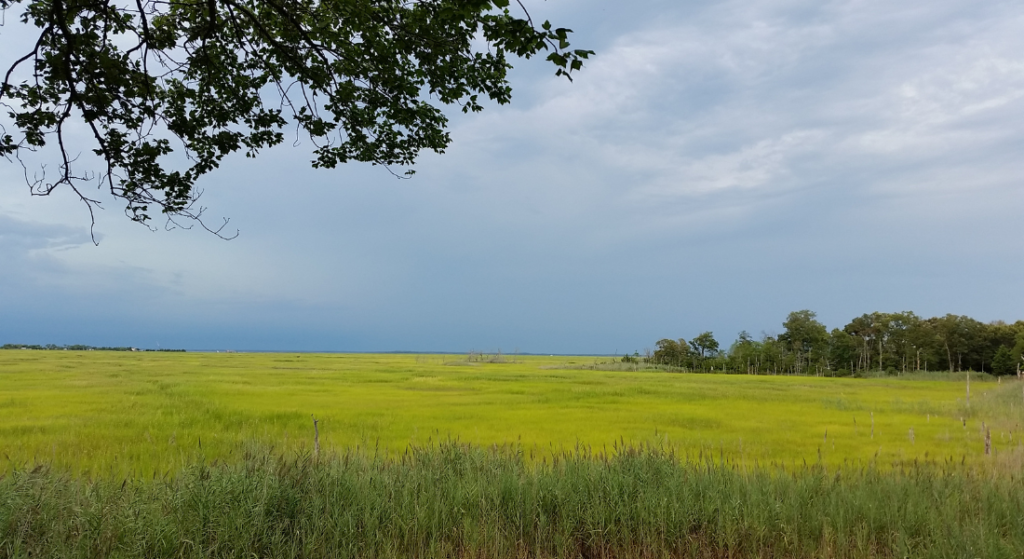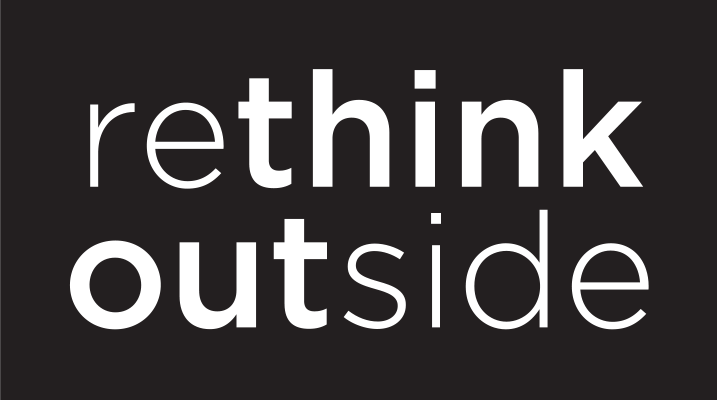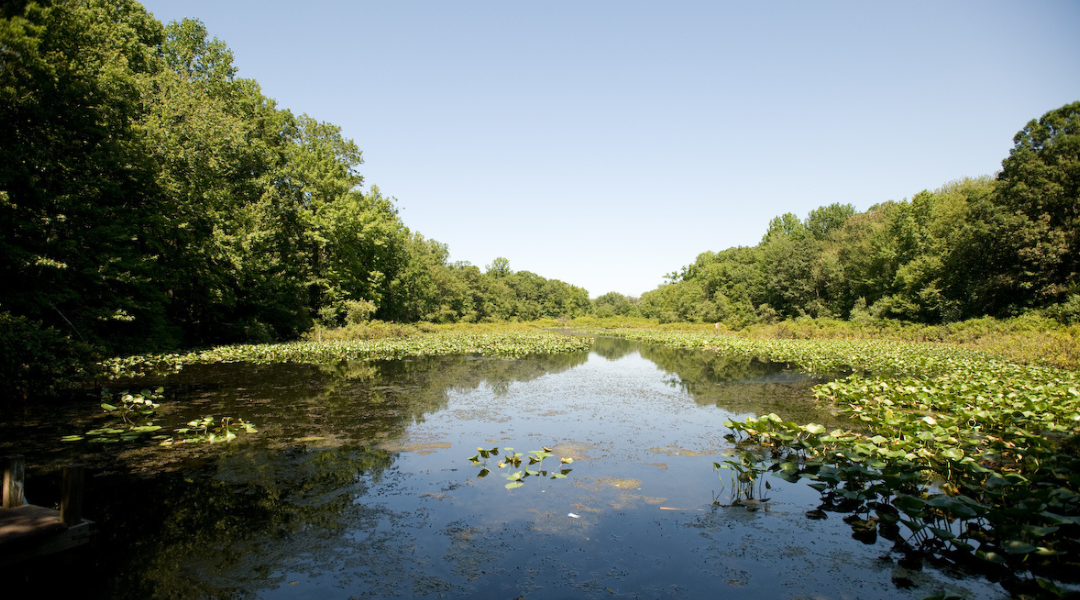The following piece is a case study written by the New Jersey Climate Change Education Initiative, showcasing its efforts to expand climate change education in New Jersey. This model, which brings together various stakeholders, can be replicated in other states and provide educators with easy access to tools and resources.
There is a broad consensus that climate change education can be a powerful tool to mitigate the worst effects of climate change. According to a 2020 study included in the National Library of Medicine, we could reduce individual yearly carbon emissions by almost 19 gigatons if all secondary school students were taught about climate change.
Despite this knowledge, climate change education has thus far not made its way into mainstream education, and oftentimes, the education that students do receive about climate change is of poor quality.
When the National Center for Science Education and the Texas Freedom Fund graded each state on its teaching of climate change in its science standards, 24 states earned no better than a C+, and some of the most populous states (such as Pennsylvania and Texas) received failing grades. While many states have adopted the Next Generation Science Standards, which include instruction on the science of climate change at the middle and secondary levels, these standards are science-specific and not representative of the full scope of content areas and grade levels. Moreover, even when educators do choose to incorporate climate change into their classrooms, they face numerous barriers as most do not have ample time to sift through the vast resources on climate change, determine what is credible, and carefully add this information into their lesson plans.
We propose that there is an efficient way to incorporate widespread climate change education into schools, and we are applying our methods in New Jersey, which is the first state to require that climate change is taught across grade levels and subjects. By sharing our methodology, we hope that other states will adapt our models to their contexts and that climate change education will become the norm across the nation.
Paving the Way in New Jersey
In 2020, NJ First Lady Tammy Murphy announced that New Jersey would be the first state in the US to integrate climate change standards across grade levels and content areas, starting in September 2022. To facilitate this, the New Jersey School Boards Association and Sustainable Jersey created a Climate Education Thought Leadership Committee to determine appropriate next steps. Their recommendations ranged from short to long-term recommendations and centered around:
- Supporting professional learning
- Providing curricular resources
- Implementing place-based climate change education that is relevant to local communities
- Facilitating support from boards of education.
The New Jersey Climate Change Education Initiative (NJCCEI), consisting of The College of New Jersey School of Education, National Wildlife Federation, New Jersey Audubon, New Jersey School Boards Association, SubjectToClimate (StC), and Sustainable Jersey, was formed to implement short-term recommendations and address the four key areas of need outlined by the Committee through an online hub called the New Jersey Climate Change Education Hub. The NJ Climate Change Education Hub (www.njclimateeducation.org) is an online portal that connects educators to the resources they need to integrate climate change into their curriculum for all subject areas and grade levels.
Action #1: Creating a Database
A lot of teaching resources about climate change already exist, so we do not necessarily need to create a plethora of new materials. As such, NJCCEI’s first action was to create a database of vetted resources for educators to utilize as they incorporate climate change education into their classrooms. As part of NJCCEI, StC spearheaded this effort by adapting its online platform to be relevant to New Jersey educators; this effort included aligning climate-related teaching resources with the New Jersey Student Learning Standards (NJSLS) and identifying NJ-centric resources.
In meetings with New Jersey stakeholders, we found that the most important criteria are scientific credibility, alignment with NJSLS, pedagogical effectiveness, ease of use, accessibility, emphasis on local and regional climate change issues, and inclusion of historically marginalized communities. The most efficient solution (efficiency being a necessity for implementing New Jersey’s new standards in a timely manner) is to connect educators with a variety of curated resources and provide them with an easy-to-use search tool so that they can find the resources they need.
Action #2: Organizing a Teacher Taskforce for Exemplar Lesson Plans
We firmly believe that teachers must be integral in this process as they are the ones who know what is best for their classrooms. Exemplar lesson plans developed by New Jersey teachers serve as illustrations of how climate-related resources can be integrated into existing curricula rather than being viewed as something additive. Furthermore, these lessons are place-based and reflect what is happening in the students’ communities, making climate change more relevant.
StC has created a subset of its teacher task force that is made up of New Jersey educators to ensure that they are included in every step of the process. We invited them to help us determine the criteria for an exemplary lesson plan. The resulting rubric garnered 80% agreement in an evaluation of its reliability, indicating that the exemplar lesson plans that will be aggregated for teachers will be evaluated reliably amongst a variety of educators.
Ultimately, teachers are our best assets, as they possess the most relevant knowledge on appropriate lesson plans and curricula. In addition, including teachers in the process creates buy-in, making them much more likely to incorporate these resources and standards into their classrooms.
Action #3: Connecting Schools to Professional Learning Opportunities
Placing teachers at the center of our efforts includes supporting their professional development, another key part of NJCCEI’s action plan. According to a 2021 report by the Brookings Institution, nearly 60% of teachers don’t teach about climate change because they feel that it is outside of their subject area. As such, they do not feel confident in their abilities to instruct on this complex and often charged subject. Thus, we have curated professional learning opportunities where educators can find reliable, foundational knowledge about climate change, as well as articles on pedagogical practices. In addition, we are presenting further professional development options as they continue to progress in their own knowledge of the subject.
Action #4: Supporting School Boards and Administrators
Finally, we will provide support to school boards and administrators to facilitate the adoption of climate change education in their schools, thereby constructing a whole-school approach to climate change. As a first step, we will devise a communication document for school boards with standardized language for describing climate change, illustrating the benefit of climate change education to students (specifically, how it prepares them for future careers), the need for community support in bringing climate change education to public schools, and responses to potential questions from community members. We will also help prepare school board members to be advocates for climate change education to superintendents by providing resources such as links with instructions about greening facility operations and suggesting helpful questions to ask superintendents about the progress and effectiveness of new climate change education standards.
In conclusion, this case study of New Jersey shows that one way to move forward on climate change education is to connect interested parties, namely educators and others working at or involved in public schools, with ample, credible resources about climate change. We are optimistic that New Jersey will set an example for the rest of the country, and the world, that climate change education is both potent and possible. As we prepare New Jersey educators for the upcoming school year, we will be documenting the process and summarizing a sample of baseline data regarding how prepared educators feel and how schools are integrating climate change into their curriculum. In the future, we hope to more rigorously monitor and evaluate the outcomes through impact assessments.
Overall, we aim to harness the potential of climate change education to dramatically shift our climate outcomes, by making educational resources accessible and easy-to use for all education. We believe that this approach is universally applicable and can be adapted to fit various state contexts, thereby facilitating climate change education to make it widespread. However, in order to do this, schools, districts, nonprofits, and higher education institutions will need adequate funding from the government and the community at large so that we can truly unlock the potential of climate change education.

About the Authors:

Margaret Wang is the co-founder and COO of SubjectToClimate. Previously, she was a high school social studies teacher, who loved integrating climate change in her economics, business, entrepreneurship, and history lessons. She received her teacher preparation certificate from Princeton University and her M.Ed. from Harvard Graduate School of Education.

Julia Turner is a Senior Research Associate at SubjectToClimate, a nonprofit organization that provides resources to teachers looking to incorporate climate change. Julia graduated from Harvard Extension School, where she received her Bachelor of Liberal Arts with a major in Economics and a minor in English. Julia has been a research associate on numerous affordable housing and community redevelopment projects, primarily working for Carras Community Investment.
For more information, please contact margaret.wang@subjecttoclimate.org
About the Supporting Organizations:
The National Wildlife Federation is America’s largest and most trusted conservation organization, that works across the country to unite Americans from all walks of life in giving wildlife a voice. since 1936, they have fought for the conservation values that are woven into the fabric of America’s collective heritage.
New Jersey Audubon is a privately supported, not-for profit, statewide membership organization. Founded in 1897, and one of the oldest independent Audubon societies. New Jersey Audubon is committed to connecting all people with nature and stewarding the nature of today for all people of tomorrow.
New Jersey School Boards Association
The New Jersey School Boards Association (NJSBA) is a non-partisan, state-created federation of boards of education founded in 1914. It provides mandated governance training to the board of education members representing 580 public school districts and the trustees representing the majority of the state’s charter schools.
SubjectToClimate is an online connector for K-12 teachers of all subjects to find credible, unbiased, and engaging materials on climate change. Their goal is to enhance climate knowledge and inspire action by making climate change teaching and learning accessible to all.
Sustainable Jersey is a network and movement of municipalities, schools and school districts working collectively to bring about a sustainable New Jersey. Acting with state agencies, non-profit organizations, foundations, academia and industry, Sustainable Jersey researches best practices for what communities could and should do to contribute to a sustainable future.
The College of New Jersey, School of Education
Founded in 1855 as the first teacher-training school in New Jersey, and the ninth in the nation, The College of New Jersey has a long commitment to the transformative power of education. Today, the School of Education is the steward of this legacy, and continues the college’s original mandate to prepare active, informed, and self-reflective educators committed to the right of all students to learn, grow, and thrive.

